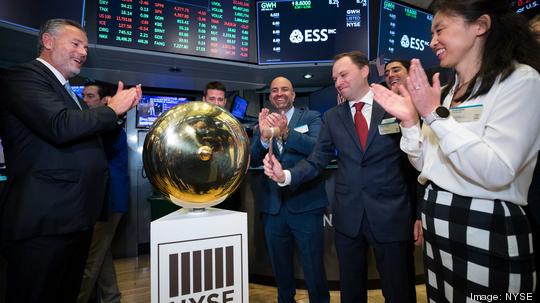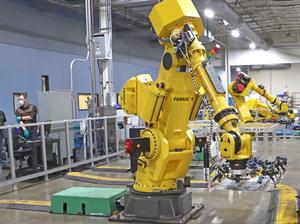
ESS Inc.’s stock dawdled in the low-to-mid $8 range in its first few hours on the New York Stock Exchange on Monday. Then it shot up to nearly $11, then fell below $10, before coming back to close at $10.42.
For CEO Eric Dresselhuys, those machinations, which left the stock up a healthy 27%, weren’t the story of the day.
“I wouldn't feel any different about things if it was $6 or $10,” he said from New York. “The way I look at it is, the company is now better capitalized and better able to go execute on growing a really large global company based in Portland than it’s ever been before.”

That’s because the SPAC merger the Wilsonville grid-scale battery maker completed on Monday brought proceeds of $308 million.
That was less than the $465 million that had been talked about when the deal was announced in May. The potential haul shrunk last week when a high percentage of SPAC investors chose to get their cash back rather than stay with ESS before the deal closed.
SPAC deals have increasingly gone in that direction in recent weeks, and Dresselhuys called it a “macro trend” that was practically unavoidable for ESS.
“Our experience here has been similar to or slightly better than the experience that almost any other (SPAC merger) company has had,” he said. “So we feel great about it.”
Strange as it might sound, high redemptions have also sparked interest in some stocks, helping drive up their share prices in a situation akin to the meme-trading frenzy of earlier this year.
The redemptions also reduce a company’s number of outstanding shares, adding to volatility and increasing the possibility of a short squeeze developing.
So there could be some ups and downs for the stock with the ticker symbol GWH in the days and weeks ahead. But Dresselhuys said that in the long run, ESS holds its fate in its hands.
“Given the size and the scale of what this energy transition represents, I think there’s a great opportunity for our employees, for our shareholders, for really everybody associated with the company to be a part of what could be one of the really great technology growth stories out of the Portland area now and maybe for a really long time,” he said.
ESS has forecast sales of its iron flow battery rising from a negligible $2 million this year to $3.5 billion by 2027 as the transition to renewable energy sources makes storing energy vital to a reliable grid.
Dresselhuys noted that representatives from around 200 countries will gather in a few weeks in Scotland for the 26th United Nations Climate Conference, with more aggressive decarbonization targets expected. And prices for natural gas — a key tool now in helping balance intermittent renewable resources on the grid — have been spiking.
“There are analysts now coming out with reports that say solar plus storage is now, with no subsidies, by far the lowest-cost way to build electricity because natural gas prices have been up phenomenally high,” Dresselhuys said. “I tell people I would hope that you would be supportive of the energy transition because you care about the environment and you want to live in a cleaner, safer planet. But if I can’t get you for that, let's just do it because it's cheaper.”
Of course, ESS will have to fulfill its promise of delivering cost-competitive storage systems that work safely for years with little overhead, which is far from a sure thing. And it’s one of a number of companies with varying technologies vying in the long-duration category, though Dresselhuys noted that ESS is the first to go public.
“We feel we’ve got first-mover advantage,” he said.







